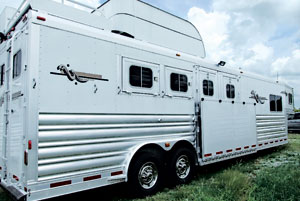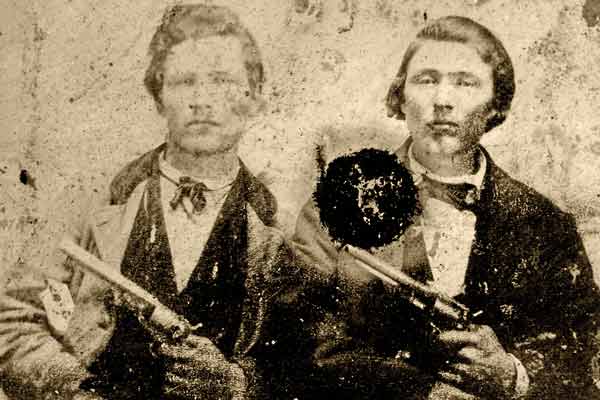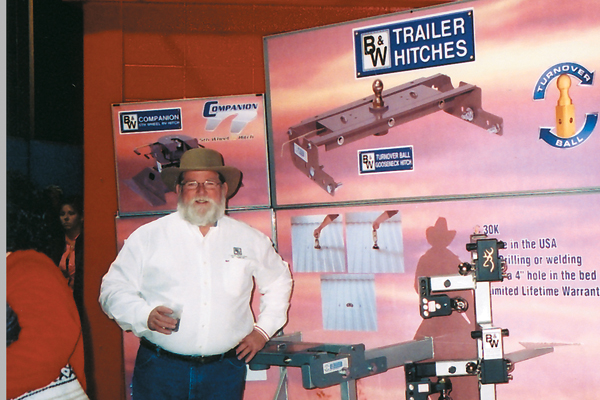
In the past year, there have been at least three serious incidents involving mounted shooters and trailers. Just last month, two young women were severely injured when a propane leak caused an explosion inside their horse trailer. In another incident, a young horse was electrocuted and died as a result of faulty trailer wiring. A few years ago, a shooter on his way to the CMSA Worlds nearly succumbed to asphyxiation when fumes from an external gasoline generator sent deadly carbon monoxide into his trailer as he slept. Thankfully friends got to him in time and saved his life.
In many cases situations like these can be prevented when properly maintained detection devices are present and occupants understand the dangers signs and take proper precautions. In other cases, owners must immediately act upon safety issues as soon as they are discovered. If not the results can be deadly.
In this article we focus on several areas of concern that all horse trailer and RV owners and traveling occupants need to understand.
Propane/Gas Detector
Propane is an extremely flammable gas that must be handled with absolute care. It is a heavy gas and can accumulate in low-lying areas, such as storage areas and floors.
Since propane is treated with a distinct odor, take precautions at the slightest smell. If you think you smell propane in your trailer, RV or the area around any gas equipment, or if a gas alarm signals the presence of propane, you should immediately follow these directions:
If You Smell Gas
1. Extinguish all smoking materials and any other open flames or sources of ignition. Everyone should vacate and move away from the vehicle without using any electric switches, appliances, thermostats, or telephones (including cell phones).
2. Close the gas shutoff valve on the propane tank or cylinder.
3. Call your propane supplier and/or your local fire department from a cellular telephone away from the vehicle.
4. Do not re-enter the vehicle or area until a qualified propane service technician and/or emergency personnel check for escaped propane.
5. Have a properly trained propane service technician repair the leak. He or the emergency responder needs to determine that the leak situation has been fully resolved. The technician should check all of your gas appliances and re-light any appliance pilots.
6. Return to the trailer or RV only when the service or emergency technician indicates it is safe to do so.All horse trailers and RV campers that use propane gas for appliances and heating are required by law to have safety equipment to prevent such accidents. It takes effort and a little discipline by the owners, however, to make sure the proper safety fixtures are in place and operational.
Propane Detector Notes
1. Be sure the factory installed propane/gas detector is functioning properly. Most wall-mounted models rely on the batteries of the trailer or RV and all will have a test function to confirm the device is working properly. Be sure your trailer batteries are in good operational condition and make sure your detector is powered at all times.
2. If your detector requires its own batteries, be sure those batteries are fresh and changed out at least twice a year. Use the built-in test function to make sure it is working properly. With no battery power, these life saving devices simply do not work.
3. Always follow the manufacturers instructions as to cleaning, maintenance and function testing.
4. Same goes for smoke detectors, most of which use internal batteries for operation.
Carbon Monoxide Gas
Carbon monoxide gas is invisible, odorless, and deadly. Carbon monoxide is produced when any fuel is burned; this includes gasoline, propane, natural gas, wood, and coal. It is extremely serious when combustion by-products are not vented outside. Carbon monoxide is the number one cause of poisoning deaths in the United States each year.
In trailers and RV’s, carbon monoxide gas usually results from:
l Exhaust leaks from either a vehicle engine or a generator.
l Improper use of portable gas powered heaters.
l Someone else’s vehicle or generator when camping in close quarters.
If your RV doesn’t have a carbon monoxide detector, you need to purchase a battery operated unit designed for use in RV’s. Test the carbon monoxide detector every time you use the RV. Replace the detector batteries at least twice a year.
Symptoms of carbon monoxide poisoning include dizziness, vomiting, nausea, muscular twitching, intense headache, throbbing in the temples, weakness and sleepiness, and the inability to think coherently. High levels of CO poisoning can be permanently disabling or fatal.
If you or anyone else experiences any of these symptoms, shut down any operating motors and gas appliances and get to fresh air immediately. If the symptoms persist seek medical attention.
Carbon Monoxide Notes
1. Inspect the generator exhaust system before using the generator, every time.
2. Avoid leaving windows and roof vents open when in close proximity to vehicle and/or generator exhaust.
3. Follow all directions, safety cautions and warnings when operating gas powered heaters.
4. If you use a portable generator, direct the exhaust away from the camping area.
5. Never use the range burners or oven to heat the RV.
6. When cooking with the range burners, use the range fan and always leave a window cracked open for fresh air and ventilation.
Electrical Safety
In the case of the horse that died by electrocution, an improperly wired trailer was the culprit. Without a proper grounding system, electricity was sent from the trailer skin through a wet lead line into a wet halter and through the horse to the wet ground, resulting in his death.
Industry experts call this “Hot-Skin.”
Hot-Skin issues with a trailer or RV are typically high resistance electrical shorts that do not usually trip breakers or blow fuses. They could be the result of bad campground power, incorrectly wired extension cords, poorly maintained RV electrical systems or simply wear and tear. Although most shocks produce only a tingling sensation, they can be serious, even deadly, especially when the ground around the vehicle is wet.
All trailers manufactured to use electricity for appliances and other electronic devices are wired with proper grounding breaker systems.
You can test to see if your trailer or RV has Hot-Skin by using a good quality voltmeter, poking the red tip of the probe into the earth and the black tip to your trailer or RV. Be sure to make connection to the metal skin of your trailer or RV by picking a spot like the trailer hitch or other metal fixture and carefully follow the instructions for use of the voltmeter.
While both probes are making contact, you should read very close to 0 (Zero) volts. The National Electrical Code allows up to 2 volts on the ground, so 1 to 2 volts is safe. If, however, you read 10 volts, 50 volts or 120 volts, that’s the time to back away from the RV, turn off the circuit breaker, pull the power plug and immediately get the campsite electrician to find out what’s wrong.
If you suspect your trailer’s electrical system may have been modified or tampered with, seek the help of a professional electrician or bring your trailer to an authorized trailer or RV repair facility.
Trailer and RV safety is no joke and should be taken seriously every time you hit the road. You just can’t take any of your tools for granted.





